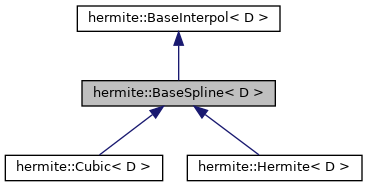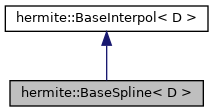Abstract base class for interpolating splines. More...
#include <base_spline.hpp>


Public Member Functions | |
| virtual | ~BaseSpline ()=default |
| Destructor. | |
| virtual double | getLowestTime () const =0 |
| Gets the lower bound of the domain of the piecewise spline function, which is the first time (lowest t-value) listed in the waypoints. More... | |
| virtual double | getHighestTime () const =0 |
| Gets the upper bound of the domain of the piecewise spline function, which is the last time (highest t-value) listed in the waypoints. More... | |
| virtual Vector< D > | getPos (const double t) const =0 |
| Gets value of the interpolation function at a certain point. More... | |
| virtual Vector< D > | getVel (const double t) const =0 |
| Gets derivative of the function at a certain point. More... | |
| virtual Vector< D > | getAcc (const double t) const =0 |
| Gets second derivative of the function at a certain point. More... | |
| double | getMaxDistance (const double timeStep) const |
| Gets maximum distance from origin. More... | |
| double | getMaxSpeed (const double timeStep) const |
| Gets maximum speed. More... | |
| double | getMaxAcceleration (const double timeStep) const |
| Gets maximum magnitude of acceleration. More... | |
| virtual double | getLength (const double timeStep) const =0 |
| Gets arc length. More... | |
 Public Member Functions inherited from hermite::BaseInterpol< D > Public Member Functions inherited from hermite::BaseInterpol< D > | |
| virtual | ~BaseInterpol ()=default |
| Destructor. | |
| virtual Vector< D > | operator() (const double t) const |
| Gets value of the interpolation function at a certain point. More... | |
Detailed Description
template<std::size_t D>
class hermite::BaseSpline< D >
Abstract base class for interpolating splines.
Member Function Documentation
◆ getAcc()
|
pure virtual |
Gets second derivative of the function at a certain point.
This will usually be the acceleration.
- Parameters
-
t Input to get value from
- Returns
- Output from function's second derivative
Implements hermite::BaseInterpol< D >.
Implemented in hermite::Hermite< D >, and hermite::Cubic< D >.
◆ getHighestTime()
|
pure virtual |
Gets the upper bound of the domain of the piecewise spline function, which is the last time (highest t-value) listed in the waypoints.
- Note
- If there are no waypoints, then returns 0
- Returns
- The last time measurement
Implemented in hermite::Hermite< D >, and hermite::Cubic< D >.
◆ getLength()
|
pure virtual |
Gets arc length.
- Parameters
-
timeStep The time step to try for the arc length
- Note
- This function will take much longer for smaller timesteps. Recommended is between 0.001 and 0.1, but this also depends on the domain of your function.
- If zero or one poses, returns 0.
- Returns
- Arc length
Implemented in hermite::Hermite< D >, and hermite::Cubic< D >.
◆ getLowestTime()
|
pure virtual |
Gets the lower bound of the domain of the piecewise spline function, which is the first time (lowest t-value) listed in the waypoints.
- Note
- If there are no waypoints, then returns 0
- Returns
- The first time measurement
Implemented in hermite::Hermite< D >, and hermite::Cubic< D >.
◆ getMaxAcceleration()
|
inline |
Gets maximum magnitude of acceleration.
- Parameters
-
timeStep The time step to try for the absolute maximum
- Note
- This function will take much longer for smaller timesteps. Recommended is between 0.001 and 0.1, but this also depends on the domain of your function.
- If no poses, returns 0.
- Returns
- Magnitude of maximum acceleration.
◆ getMaxDistance()
|
inline |
Gets maximum distance from origin.
- Parameters
-
timeStep The time step to try for the absolute maximum
- Note
- This function will take much longer for smaller timesteps. Recommended is between 0.001 and 0.1, but this also depends on the domain of your function.
- If no waypoints, returns 0.
- Returns
- Maximum distance from the origin.
◆ getMaxSpeed()
|
inline |
Gets maximum speed.
- Parameters
-
timeStep The time step to try for the absolute maximum
- Note
- This function will take much longer for smaller timesteps. Recommended is between 0.001 and 0.1, but this also depends on the domain of your function.
- If no poses, returns 0.
- Returns
- Maximum speed.
◆ getPos()
|
pure virtual |
Gets value of the interpolation function at a certain point.
Same as calling operator()()
- Parameters
-
t Input to get value from
- Returns
- Output from function
Implements hermite::BaseInterpol< D >.
Implemented in hermite::Hermite< D >, and hermite::Cubic< D >.
◆ getVel()
|
pure virtual |
Gets derivative of the function at a certain point.
This will usually be the velocity.
- Parameters
-
t Input to get value from
- Returns
- Output from function's derivative
Implements hermite::BaseInterpol< D >.
Implemented in hermite::Hermite< D >, and hermite::Cubic< D >.
The documentation for this class was generated from the following file:
- /home/runner/work/hermite/hermite/include/hermite/base_spline.hpp